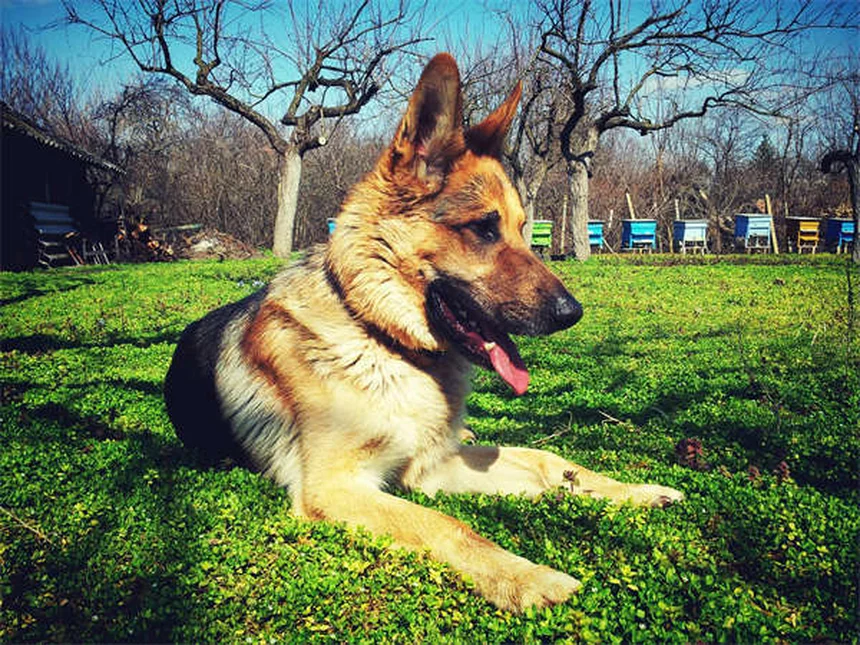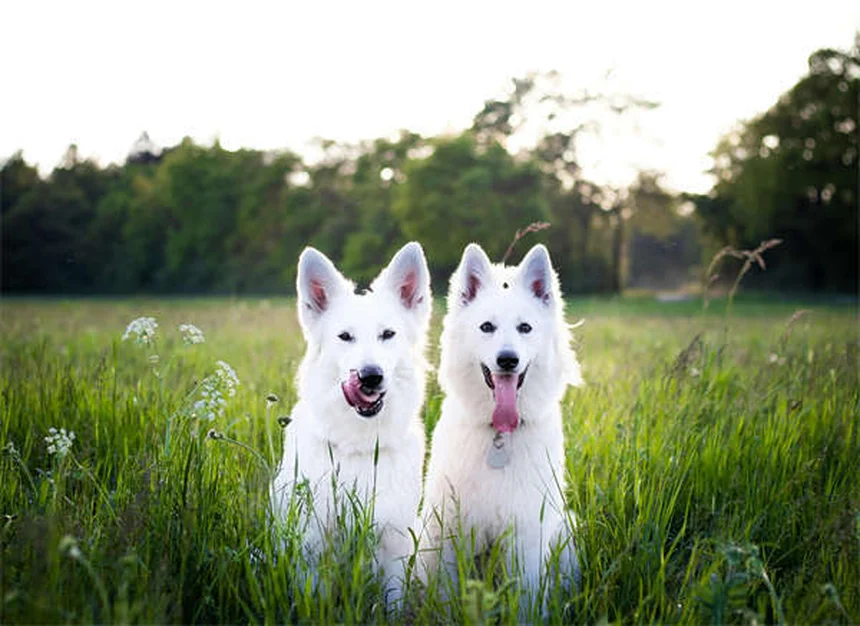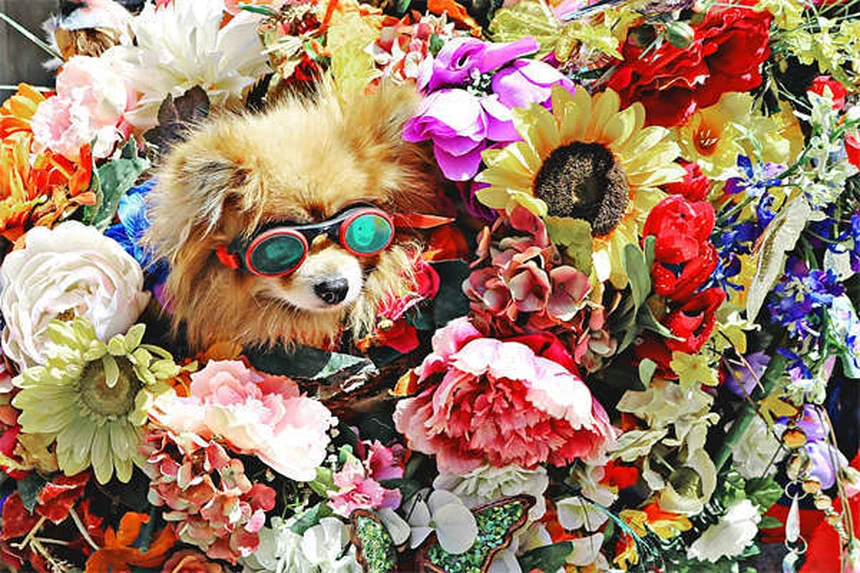Why Do Dogs Stare at You When They Poop? 5 Surprising Reasons
Why do dogs stare at you when they poop? The answer is: It's completely normal dog behavior with several possible explanations! While it might feel awkward to lock eyes during your pup's private moment, this behavior actually reveals fascinating insights into canine psychology and your special bond.As a dog owner myself, I've experienced those intense bathroom stares countless times. At first, I wondered if my golden retriever was judging me or asking for privacy. But after consulting veterinarians and animal behaviorists, I learned the truth is much more interesting. Your dog isn't being weird - they're communicating in their own way!In this article, we'll explore the top theories behind this behavior, from vulnerability to seeking approval. You'll also learn whether you should stare back (spoiler: it depends!) and how to turn potty time into positive bonding moments. Plus, we'll cover why monitoring bathroom habits is crucial for your dog's health.
E.g. :Dog Vaccinations: Essential Shots Every Pet Owner Must Know
- 1、Why Do Dogs Stare at You During Potty Time?
- 2、Decoding Your Dog's Bathroom Behavior
- 3、Should You Stare Back? The Great Poop Eye Contact Debate
- 4、More Than Just Eye Contact: Monitoring Bathroom Health
- 5、Creating Positive Bathroom Experiences
- 6、Embracing the Quirks of Dog Ownership
- 7、The Science Behind Canine Eye Contact
- 8、Cultural Differences in Dog Behavior
- 9、Beyond the Bathroom: Other Weird Dog Staring Moments
- 10、Training Alternatives to the Bathroom Stare
- 11、Understanding Your Dog's Unique Personality
- 12、Fun Facts About Dog Vision
- 13、FAQs
Why Do Dogs Stare at You During Potty Time?
The Mystery Behind Those Puppy Eyes
Picture this: You're standing in the backyard, enjoying the fresh air, when suddenly you notice your furry best friend giving you that look while doing their business. Why do dogs make eye contact during such private moments? Let's dig into this fascinating behavior that puzzles even veterinarians!
Dr. Emily Gamm, a veterinarian from Nebraska, puts it perfectly: "Dogs are weird. Amazing, but weird." While we don't have definitive answers, we've got some pretty solid theories that might explain this bathroom behavior.
The Vulnerability Factor
Imagine you're in the middle of a yoga class when suddenly you realize you forgot to lock the bathroom door at home. That's kind of how dogs feel when they poop! In the wild, this would be prime time for predators to attack.
Dr. Rochelle Hartson explains: "Dogs may look at you for reassurance, making sure you've got their back." It's like having a bathroom buddy who watches the door while you're occupied. This vulnerable moment explains why your pup seeks eye contact - you're their security guard against imaginary toilet tigers!
Decoding Your Dog's Bathroom Behavior
 Photos provided by pixabay
Photos provided by pixabay
Are They Seeking Approval?
Remember all those treats you gave during potty training? That positive reinforcement created lasting connections in your dog's brain. Even years later, they might be thinking: "Hey human, I'm doing it right! Where's my cookie?"
But here's the funny part - your dog might not actually be staring at you. Dog behaviorist Dana Fedman suggests: "You're probably just in their line of sight." Dogs don't feel bathroom shame like humans do. That intense gaze? Might just be them scanning the environment while you happen to be in view!
It's Just Business, Nothing Personal
Let's bust a common myth: Dogs don't understand bathroom etiquette like we do. While we might feel awkward about eye contact during private moments, your pup sees it differently. Elimination is simply a bodily function - no moral judgments involved!
Fedman explains this perfectly: "Dogs aren't going to look away because they're ashamed—that's a human trait." We often humanize our pets' actions, but in reality, your dog's bathroom stare is probably just coincidence rather than intentional communication.
Should You Stare Back? The Great Poop Eye Contact Debate
To Look or Not to Look
Now for the million-dollar question: What should you do when caught in this awkward bathroom standoff? The answer might surprise you!
If you're comfortable with it, maintaining eye contact can actually provide reassurance. Think of it as saying "I've got your back" without words. But if it feels too weird? Totally fine to look away or reposition yourself. Pro tip: Standing behind your dog often reduces the stare-downs!
 Photos provided by pixabay
Photos provided by pixabay
Are They Seeking Approval?
Here's a simple guide to handling these situations:
| Situation | Recommended Action |
|---|---|
| Your dog stares while pooping | Brief eye contact or casual glance away |
| They seem anxious during bathroom time | Soft verbal reassurance |
| After finishing their business | Verbal praise or quick pet (if they enjoy it) |
Remember, every dog is different. Some might appreciate your attention, while others prefer privacy. The key is observing your pup's unique preferences!
More Than Just Eye Contact: Monitoring Bathroom Health
Why Watching Matters
Did you know your dog's bathroom habits can reveal important health clues? While you're observing those puppy eyes, take note of their actual bathroom behavior too!
Dr. Gamm emphasizes: "Your dog's poop can be a very helpful indicator for their health status." Here's what to watch for:
- Frequency changes (suddenly going more/less often)
- Straining or difficulty
- Changes in consistency (too hard or too soft)
- Unusual color
What's Normal and What's Not?
Ever wondered how healthy dog poop should look? Here's the scoop (pun intended)! Healthy stools should be:
Formed but not rock-hard, moist but not runny, and consistent in color. If you notice dramatic changes that last more than a day or two, it might be time to call your vet.
Did you know that canned pumpkin (plain, not pie filling!) can help with mild digestive issues? It's like nature's Pepto-Bismol for pups! But remember - persistent problems always warrant professional advice.
Creating Positive Bathroom Experiences
 Photos provided by pixabay
Photos provided by pixabay
Are They Seeking Approval?
Want to help your dog feel more at ease during bathroom breaks? Consider these tips:
First, choose a quiet, consistent spot. Dogs appreciate routine as much as we appreciate our morning coffee! Second, give them enough time - rushing them can create anxiety. And finally, stay calm and relaxed yourself. Dogs pick up on our energy!
When to Seek Help
While occasional bathroom quirks are normal, certain signs should prompt a vet visit:
- Blood in stool
- Persistent diarrhea or constipation
- Visible discomfort or pain
- Sudden changes in habits lasting more than 48 hours
Remember, you know your dog best. When in doubt, it's always better to err on the side of caution and consult your veterinarian.
Embracing the Quirks of Dog Ownership
The Joy of Canine Quirks
At the end of the day, those bathroom stares are just one of many endearing (and sometimes puzzling) dog behaviors. Instead of feeling awkward, why not see it as a special moment of connection?
Your dog trusts you enough to be vulnerable around you - that's pretty amazing when you think about it! These little moments are what make the human-canine bond so unique and rewarding.
A Final Thought
Next time you're caught in a bathroom stare-down with your pup, smile knowing you're witnessing one of life's funny little mysteries. Whether it's for security, habit, or pure coincidence, this behavior is just another reason why we love our four-legged friends!
The Science Behind Canine Eye Contact
More Than Just a Stare
You know that intense gaze your dog gives you? It's actually packed with meaning! Research shows that when dogs make eye contact with humans, their brains release oxytocin - the same "love hormone" that bonds human parents with their babies. That bathroom stare might be your dog's way of saying "I love you" in the weirdest possible moment!
But here's something even more fascinating: Wolves, dogs' closest relatives, rarely make eye contact with humans. This suggests that dogs evolved this behavior specifically to communicate with us. So when your pup locks eyes during potty time, they're actually demonstrating thousands of years of evolutionary adaptation!
The Pack Mentality Connection
Ever notice how dogs often circle before doing their business? This behavior dates back to their wild ancestors who needed to check for safety and mark territory. The eye contact? That's part of the safety check too!
In wolf packs, members constantly monitor each other's body language for signs of danger. Your dog might be instinctively looking to you as their "pack leader" for protection during vulnerable moments. You're basically their bathroom bodyguard! Pretty cool responsibility, right?
Cultural Differences in Dog Behavior
Do All Dogs Stare Equally?
Here's something that might surprise you: Not all dogs around the world exhibit this behavior to the same degree. Studies comparing dogs from different cultures show fascinating variations in eye contact habits.
For example, dogs in countries where they're primarily working animals (like livestock guardians) tend to make less eye contact than pampered pets in Western households. This suggests that how we interact with our dogs shapes their communication styles - including those awkward bathroom stares!
The Human Influence Factor
Think about how you've trained your dog. If you've used lots of eye contact during training sessions (like maintaining focus during "watch me" commands), you've probably reinforced this behavior without even realizing it.
Dogs are brilliant at picking up patterns. If looking at you during certain activities gets them praise or treats, they'll naturally extend that behavior to other situations - yes, even bathroom breaks! It's not manipulation; it's just smart canine learning at work.
Beyond the Bathroom: Other Weird Dog Staring Moments
The Dinner Table Stare Down
While we're talking about awkward staring situations, let's address the elephant in the room - the "I want your food" gaze. This intense focus actually activates the same neural pathways as the bathroom stare!
Scientists believe both behaviors stem from dogs' ability to hijack human caregiving responses. Those puppy-dog eyes trigger our nurturing instincts so effectively that researchers found even people who don't own dogs respond to them. No wonder we can't resist slipping them table scraps!
The Midnight Watch
Ever woken up to find your dog staring at you in the dark? Creepy, right? But this is actually another variation of the same protective behavior. Your dog is checking on their most important pack member - you!
Here's a fun fact: Dogs' eyes glow in the dark because of a special reflective layer called the tapetum lucidum. This adaptation helps them see better in low light, but it also means their midnight stares are extra noticeable. Nature's built-in nightlights!
Training Alternatives to the Bathroom Stare
Teaching Polite Potty Behavior
If the constant eye contact during bathroom breaks makes you uncomfortable, you can actually train alternative behaviors. It's all about redirecting their natural instincts in ways that work better for both of you.
Try this simple method: When you take your dog out to potty, bring a favorite toy. As they finish their business, toss the toy a short distance away. This teaches them to focus forward after elimination rather than turning to stare at you. Plus, it makes potty time more fun!
The Power of Verbal Cues
Another effective approach is establishing specific bathroom phrases. Use a cheerful "good potty!" when they're finishing up, then immediately walk a few steps away. Over time, your dog will learn to associate the verbal praise with completion and come to you rather than staring.
Remember to keep training positive and patient. Changing ingrained behaviors takes time, but consistency pays off. Before you know it, those awkward bathroom moments will feel much more comfortable for everyone!
Understanding Your Dog's Unique Personality
Breed Differences Matter
Did you know some dog breeds are more prone to intense eye contact than others? Herding breeds like Border Collies and Australian Shepherds are famous for their "eye" - the ability to control livestock with just a stare. This trait often carries over into their interactions with humans too!
On the other hand, more independent breeds like Shiba Inus or Afghan Hounds tend to be less focused on human eye contact. Here's a quick comparison:
| Breed Type | Likelihood of Intense Eye Contact | Typical Personality Trait |
|---|---|---|
| Herding Dogs | Very High | Highly attentive to human cues |
| Companion Dogs | Moderate | Social but less intense focus |
| Independent Breeds | Low | More self-directed behavior |
Respecting Individual Preferences
Just like people, every dog has unique comfort levels with eye contact. Some may seek constant visual connection, while others prefer brief glances. Pay attention to your dog's signals - if they frequently look away during interactions, they might be telling you they need more personal space.
The key is finding that sweet spot where both you and your furry friend feel comfortable. After all, the human-canine bond is all about mutual understanding and respect!
Fun Facts About Dog Vision
How Dogs Actually See Us
Ever wondered what you look like through your dog's eyes? Their vision is quite different from ours in several ways. While they don't see colors as vividly as we do, they're much better at detecting movement - which explains why they notice that squirrel before you do!
Here's an interesting tidbit: Dogs have a wider field of vision than humans (about 240 degrees compared to our 180 degrees), but their binocular vision (where both eyes focus together) is narrower. This means they can see more around them, but with less detail directly in front. Maybe those bathroom stares are their way of focusing on what matters most - you!
The Nose Knows Best
While we're talking about senses, let's not forget about your dog's incredible nose. Their sense of smell is between 10,000 to 100,000 times more acute than ours. This superpower means they're gathering tons of information about you - your health, emotions, and even where you've been - all through scent.
So when your dog stares at you during private moments, remember they're experiencing the world in a completely different way than we do. That intense gaze is just one small part of how they connect with and understand their favorite human - you!
E.g. :Why Do Dogs Look at You When They Poop? | PetMD
FAQs
Q: Is it normal for dogs to make eye contact while pooping?
A: Absolutely! Many dog owners report this behavior, and veterinarians confirm it's perfectly normal. While we can't know exactly what's going through your pup's mind, experts suggest several possible reasons. Your dog might be seeking security during a vulnerable moment, checking for your approval like during potty training days, or simply scanning their environment with you in their line of sight. The important thing to remember is that this behavior isn't cause for concern - it's just one of those quirky canine things that makes our furry friends so endearing!
Q: Should I maintain eye contact when my dog stares at me during bathroom time?
A: This really comes down to your comfort level and your dog's personality. Some dogs seem to find reassurance in brief eye contact, as if they're checking that you're standing guard. Others might just be casually looking around. If you're comfortable with it, a soft glance can be fine. But if it feels awkward, there's no harm in looking away or repositioning yourself slightly. Many owners find standing behind their dog reduces the intense stares. The key is observing your individual dog's reactions - some might appreciate a quiet "good boy/girl" when they finish, while others prefer complete privacy.
Q: Could my dog's bathroom staring be related to past potty training?
A: Great question! Many behaviorists believe this could be a factor. During potty training, we often give lots of praise, treats, and positive reinforcement when our dogs go in the right spot. That creates strong associations in their brains between eliminating and receiving rewards from you. Even years later, your dog might glance up expecting that same positive feedback. As certified dog behaviorist Dana Fedman explains, "that potty training reward center goes deep." So while your adult dog probably doesn't need the training reinforcement anymore, those early lessons can leave lasting impressions on their behavior patterns.
Q: What should I do if my dog seems anxious during bathroom time?
A: If your pup appears nervous or stressed while going potty, there are several gentle ways to help. First, ensure they have a quiet, consistent bathroom spot where they feel safe. You might try staying closer (but not staring) to provide security, or speaking softly with reassuring phrases. Some dogs benefit from having their own "potty routine" with specific routes or rituals. If anxiety persists, consider possible environmental stressors like loud noises or unfamiliar animals in the area. For chronic anxiety, consult your veterinarian or a certified animal behaviorist who can create a customized plan to make bathroom time more comfortable for your furry friend.
Q: How can I tell if my dog's bathroom behavior indicates health problems?
A: While occasional staring is normal, changes in elimination habits can signal health issues. Veterinarian Dr. Emily Gamm recommends monitoring: frequency (suddenly going more/less often), difficulty (straining or taking longer), and stool consistency (too hard or too soft). Also watch for blood, mucus, or dramatic color changes. Healthy dog poop should be formed but not rock-hard, and relatively consistent in color. Keep in mind that diet changes can temporarily affect stool quality, but persistent issues lasting more than 48 hours warrant a vet visit. Pro tip: Taking quick photos of unusual stools can help your vet with diagnosis!







